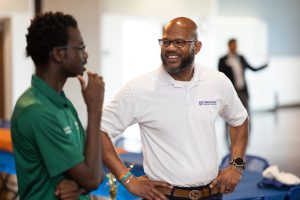Effective communication is one of the most important life skills for youth to develop. Whether you are talking to friends, family, or teachers, being able to express yourself clearly and listen to others will set you up for success in all areas of life. In 4-H, communication is a key part of leadership, teamwork, and collaboration. It is not just about talking but learning to listen, understand, and respond thoughtfully. Being a good communicator helps you build strong relationships and positively resolve conflicts.

In today’s world, communication goes far beyond face-to-face conversations. It is also essential to know how to communicate well in writing, whether you are sending an email, posting on social media, or submitting a school assignment. Being clear, respectful, and professional in written communication shows that you value the person you are communicating with. Good communication skills can help you stand out in job applications, leadership roles, and even personal relationships by showing that you are responsible and thoughtful in how you interact with others.
Tips for Building Effective Communication Skills:
- Practice Active Listening: Pay close attention to what others are saying without interrupting. Show your engagement by asking questions or summarizing what they said to ensure understanding.
- Maintain Eye Contact: This shows you are confident and paying attention during conversations. It also helps build trust with the person you are speaking to.
- Be Aware of Body Language: Your posture, gestures, and facial expressions can convey messages just as much as your words. Stand tall, smile, and use open body language to appear approachable.
- Stay Calm Under Pressure: When conflicts arise, take a deep breath and remain calm. Respond thoughtfully instead of reacting emotionally to show maturity in handling tough situations.
- Practice Speaking Clearly and Confidently: Whether you are giving a presentation or just sharing ideas in a group, speak loudly enough to be heard and articulate your words clearly.

By incorporating these tips into your daily interactions, you can improve your communication skills and become a more effective leader in the 4-H community and beyond.
 0
0
